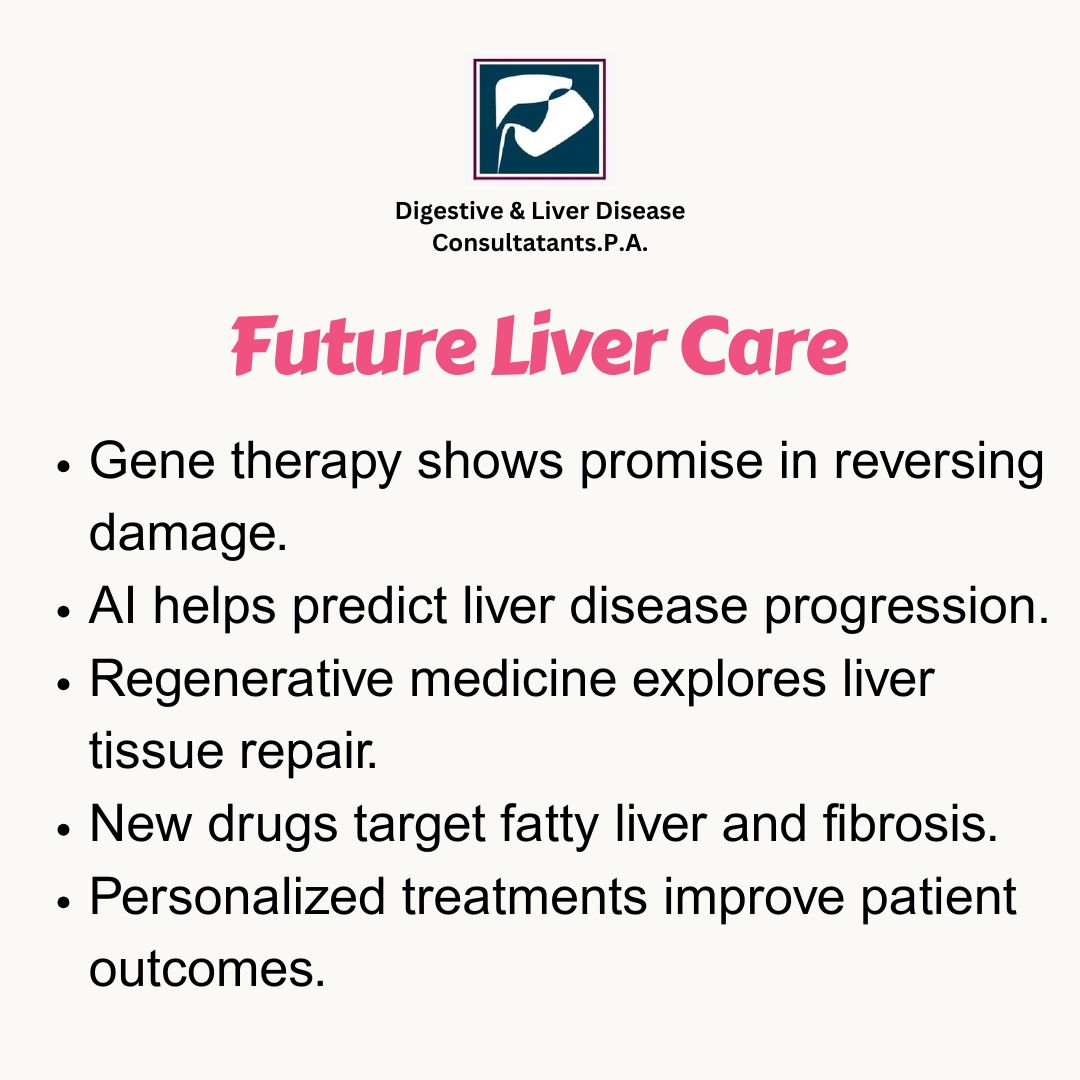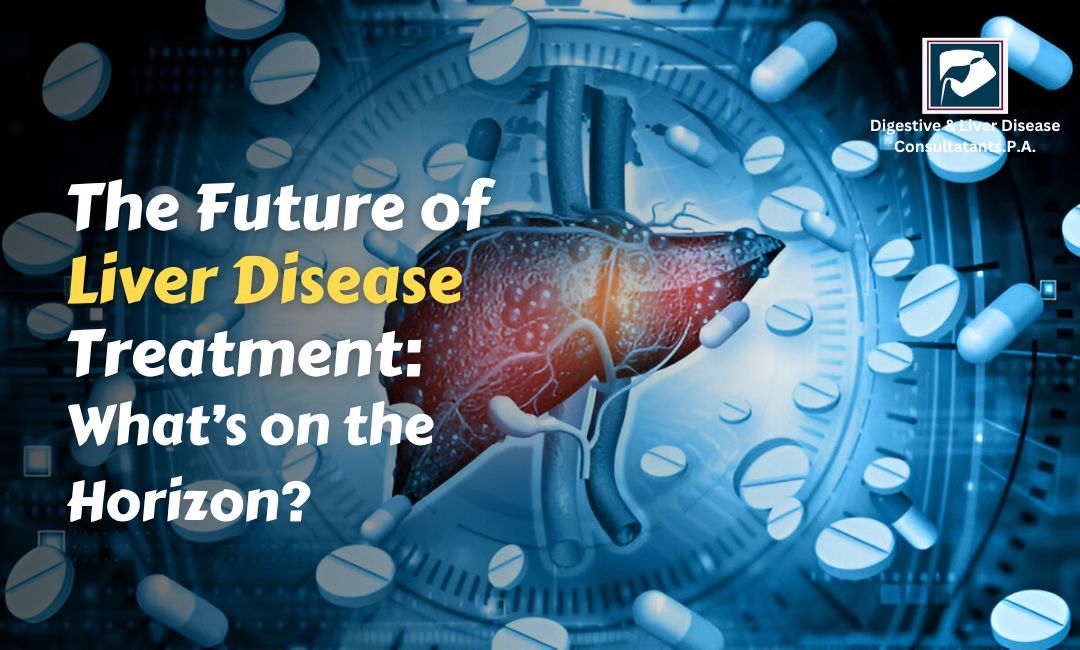Liver disease affects millions of people across the globe and is becoming more common due to rising rates of obesity, diabetes, alcohol use, and hepatitis infections. But there is hope on the horizon. Thanks to advances in medical research and technology, the future of liver disease treatment looks brighter than ever.
In this blog, we’ll explore what’s coming next in liver disease treatment—from innovative medications and personalized therapies to new diagnostic tools—and how Digestive & Liver Disease Consultants, P.A. is at the forefront of these exciting changes.
Understanding Liver Disease
The liver is a vital organ responsible for processing nutrients, filtering toxins, producing bile for digestion, and storing energy. When the liver becomes damaged or inflamed, its ability to perform these tasks is affected. Common liver diseases include:
- Fatty liver disease (NAFLD/NASH)
- Hepatitis B and C
- Cirrhosis
- Alcoholic liver disease
- Autoimmune liver conditions
- Liver cancer
In many cases, liver disease can develop silently, showing symptoms only when the damage is advanced. That’s why early detection and effective treatment are crucial.

1. New Medications for Fatty Liver Disease (NAFLD/NASH)
Nonalcoholic fatty liver disease (NAFLD), and its more severe form—nonalcoholic steatohepatitis (NASH)—are now among the most common liver conditions worldwide. Until recently, there were no FDA-approved medications for NASH.
What’s changing:
Several new drugs are in late-stage clinical trials or have recently received approval. These drugs aim to:
- Reduce fat buildup in the liver
- Slow or reverse liver fibrosis (scarring)
- Improve liver function
Medications like resmetirom and obeticholic acid are showing promise in treating NASH by targeting the root causes, not just the symptoms.
2. Personalized Liver Care and Genetics
In the future, liver disease treatment may be tailored to each patient’s unique genetic makeup.
How it works:
Genetic testing and advanced lab techniques can identify markers that predict how someone will respond to a particular treatment. This means doctors could offer personalized treatment plans that are more effective and have fewer side effects.
This approach is already being tested in conditions like autoimmune hepatitis and some liver cancers.
3. Artificial Intelligence (AI) and Early Detection
Artificial Intelligence is being used to improve how we detect and monitor liver disease.
What’s new:
AI-powered tools can analyze imaging scans and lab results with great accuracy. These systems can detect signs of liver fibrosis, cirrhosis, or liver cancer even before symptoms appear.
This helps in:
- Detecting disease earlier
- Reducing the need for invasive biopsies
- Monitoring changes over time more precisely
At Digestive & Liver Disease Consultants, P.A., we are excited about integrating AI technology into our diagnostic process to provide better and faster care.
4. Liver Regeneration and Stem Cell Research
What if we could regrow damaged liver tissue?
The future says yes.
Scientists are studying how stem cells can be used to regenerate liver tissue and heal damage caused by diseases like cirrhosis. While this is still in the research phase, early results are promising and could revolutionize liver treatment in the coming decade.
In the future, stem cell therapies might:
- Reverse liver damage
- Reduce the need for liver transplants
- Help patients recover faster
5. Better Support for Liver Transplant Patients
For some patients with severe liver damage, transplantation is the only option. But organ shortages and complications after surgery remain big challenges.
Coming soon:
New medications and surgical techniques are improving transplant outcomes. Additionally, researchers are exploring the use of bioengineered livers and xenotransplantation (using animal organs for humans) to solve the donor shortage crisis.
With better care before and after transplant, patients are now living longer and healthier lives.
6. Immunotherapy and Liver Cancer
Liver cancer is often hard to treat because it's usually diagnosed at a late stage.
Hope ahead:
Immunotherapy, which uses the body’s own immune system to fight cancer, is showing great success in liver cancer treatment. Drugs like checkpoint inhibitors are helping some patients live longer and with better quality of life.
Ongoing clinical trials are exploring new drug combinations that might become the standard treatment in the next few years.
7. Lifestyle-Based Treatments: A Key Component
Even with all the technological advances, nutrition and lifestyle changes remain powerful tools in managing liver disease.
Doctors now work closely with nutritionists, physical therapists, and mental health professionals to offer a whole-body approach to treatment. This includes:
- Weight management programs
- Alcohol cessation support
- Diabetes control
- Tailored exercise plans
At Digestive & Liver Disease Consultants, P.A., we offer this comprehensive care model to give our patients the best chance at recovery and long-term liver health.
The Role of Digestive & Liver Disease Consultants, P.A.
Digestive & Liver Disease Consultants, P.A. is a leading center for gastrointestinal and liver care in Texas. Our expert team includes board-certified gastroenterologists and hepatologists who are dedicated to staying up to date with the latest treatment advances.
We provide state-of-the-art diagnostic tools, personalized treatment plans, and compassionate care for patients facing liver diseases such as:
- Fatty liver disease
- Hepatitis B and C
- Liver cirrhosis
- Liver cancer
- Alcoholic liver disease
Whether you’re newly diagnosed or managing a long-term condition, our specialists are here to guide you every step of the way.
Conclusion
The future of liver disease treatment is full of promise. From new medications and personalized therapies to stem cell treatments and AI-powered diagnostics, we are entering an exciting era of medical progress. These advances mean better outcomes, earlier detection, and more treatment options for people living with liver disease.
If you or a loved one is experiencing symptoms of liver disease—such as fatigue, jaundice, abdominal pain, or abnormal liver tests—don’t wait. Contact Digestive & Liver Disease Consultants, P.A. today to schedule an appointment.






